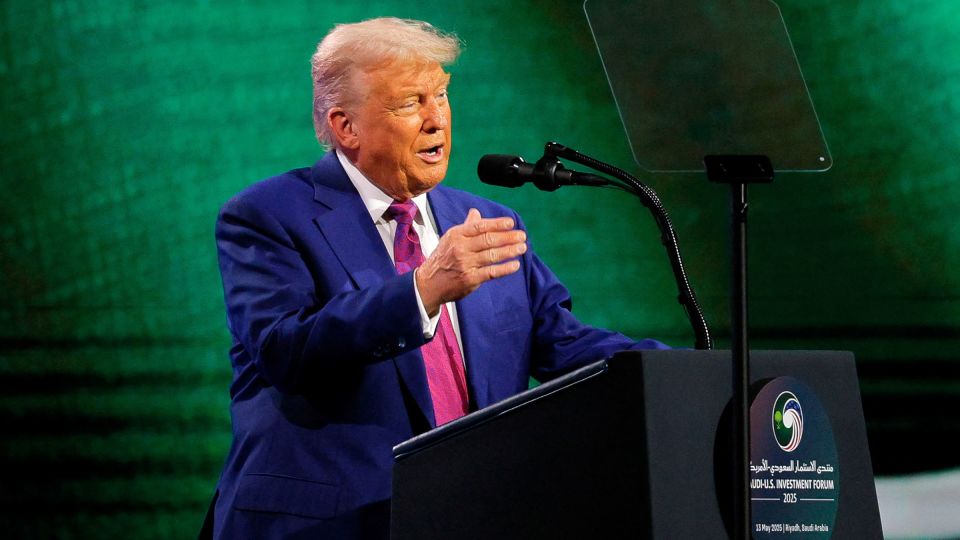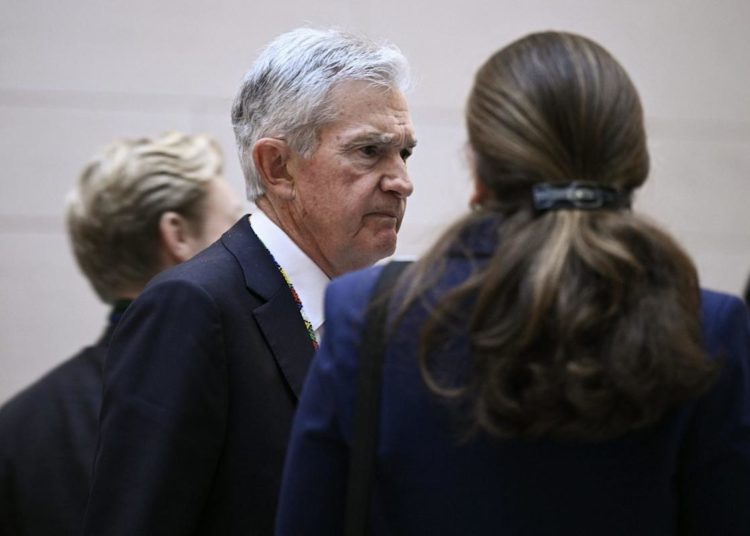President Donald Trump would plainly like America to be more like the Gulf states he’s touring on the first big foreign trip of his new term.
He got a purple-carpeted welcome fit for a king in Saudi Arabia from Mohammed bin Salman, the ruthless and modernizing crown prince, that outstripped the showers of personal adulation from his top officials back home. Trump was greeted with camels, red Cybertrucks and a red carpet on his next stop in Qatar Wednesday after landing in his aging Air Force One jet – rather than the newer 747-8 his hosts want to gift him.
“We’ve launched the Golden Age of America,” Trump said in a major speech in Riyadh. “The Golden Age of the Middle East can proceed right alongside of us.”
His trip, which also includes a stop in the United Arab Emirates, is already a window into his second term.
The soliciting of hundreds of billions of dollars in foreign investment shows “America first” is as much an economic strategy as a foreign policy. And as Trump palled around with MBS, as the Saudi crown prince is widely known, it was clear the president is right at home with rich authoritarian leaders who head nations where the line between politics and personal enrichment is blurred. No one in Riyadh was complaining that his visit is also serving as a tacit endorsement of business deals his sons have clinched in countries along his route.
But Trump’s lavishing of attention on Gulf states is also highlighting the region’s rise to geopolitical and economic might. The financial muscle of oil-rich Saudis, Qataris and Emiratis is engineering a power shift from the West to the East.
This will be obvious in Qatar. The tiny state, smaller than Connecticut and home to 2.5 million people, is now a fulcrum of diplomacy and has made itself indispensable to the foreign policies of Republican and Democratic presidents. It connects warring nations and hostile groups including the United States, Iran, Russia, Ukraine, Hamas, Israel, Lebanon and its rival factions, the Taliban, Congo and M23 rebels. If there’s a war that needs to be ended or a hostage to be freed, Qatar, acting almost as a mini-United Nations, will be involved.
Trump hails a ‘transformation’ he’d love to emulate
Trump is on the hunt for $1 trillion of Gulf investment to balance his tariff-led strategy to reinvent the US economy.
But his head was turned by transformations wrought by his hosts in their own backyards, which are unencumbered by the planning regulations and environmental curbs he often bemoans in the US.
Armed with sovereign wealth funds, they’re revolutionizing sports and the arts as they build vast modern cities, transport links and stadia to guarantee their futures when carbon resources are drained. Qatar hosted the FIFA World Cup in 2022, as part of a PR strategy critics decry as an attempt to “sports wash” its poor human rights record. Saudi Arabia launched spending sprees to bankroll sports teams and leagues. In a politics and sports double play, it founded a pro golf league and held events at Trump resorts. The World Cup is coming in 2034. Trump was sure to give FIFA supremo Trump fan Gianni Infantino a shoutout in his speech Tuesday.
Admiration and even envy creep into Trump’s voice in a region where he’s far more comfortable than in the chancelleries of Old Europe.
“Majestic skyscrapers,” Trump, who’s built a few towers himself, marveled in Riyadh. “It’s amazing genius.” He went on: “in other cities throughout the peninsula, places like Dubai and Abu Dhabi and Doha, Muscat, the transformations have been unbelievably remarkable. Before our eyes, a new generation of leaders is transcending the ancient conflicts of tired divisions of the past and forging a future where the Middle East is defined by commerce, not chaos, where it exports technology, not terrorism.”
In Trump’s endorsement of the aggressive Gulf development model, it’s hard not to see political aspirations for back home. What would Trump give for authoritarian powers, curbed political freedoms, no court and media scrutiny and the unlimited authority to spend billions that the region’s leaders enjoy?
The president’s affection for strongmen is well known. But an interaction with MBS on Tuesday was jarring even for him.
“I like him a lot,” Trump said, smirking at the de facto Saudi leader, blamed by US intelligence for approving the gruesome 2018 killing of Washington Post columnist Jamal Khashoggi. “I like him too much. That’s why we give so much. You know? Too much. I like you too much.”
The president made it clear that America under his watch is open for business and won’t ask too many questions about where the cash comes from.
“In recent years, far too many American presidents have been afflicted with the notion that it’s our job to look into the souls of foreign leaders and use US policy to dispense justice for their sins,” Trump said, inaugurating a new age of an ultra-realist foreign policy Tuesday. “I believe it is God’s job to sit in judgment – my job (is) to defend America and to promote the fundamental interests of stability, prosperity, and peace.”
How Qatar made itself America’s diplomatic fixer
Trump’s endless search for “wins” came up with $600 billion in new investments for the US on Tuesday. It’s typical for such numbers to be inflated by back-counting of deals already on the books and future promises that never materialize.
But there was also a win for the people of Syria, as Trump announced the lifting of US sanctions following the fall of the Assad regime last year – the latest of a string of presidential decisions that might irk Israeli Prime Minister Benjamin Netanyahu.
Trump met Wednesday morning with the Syrian leader, a remarkable development considering Ahmad al-Sharaa was at one time a jihadist with a $10 million US bounty on his head (the US removed the bounty in December as Sharaa has worked to build diplomatic connection to his new regime). Trump and Sharaa were joined by MBS in person for the Wednesday meeting, as well as Turkey’s President Recep Tayyip Erdogan, who joined by phone.
The White House is emphasizing Trump’s tour as primarily an economic mission. But the interlocking nature of US economic and security policy will be emphasized in his stop in Qatar.
This is a country that defines the term “punching above its weight.” To guarantee its safety in a violent region plagued by border conflicts, it’s made itself indispensable to the US and its allies. At the vast, and once secret, Al Udeid Air Base that it built in the desert outside Doha, runways and US military installations stretch as far as the eye can see.
As international geopolitical structures fray, the Doha government has made a name as a rare broker of intractable disputes between enemies, sometimes thousands of miles outside its own neighborhood.
“We are a small country, but we have a long outreach,” Qatari Foreign Minister Mohammed bin Abdulrahman Al Thani told the Washington Post in an interview published Monday. “Sometimes, being a small country enables you to move fast and to be able to engage with everybody.”
Qatar must have one of the busiest foreign ministries on the planet. It’s worked on hostage releases and ceasefire efforts amid the Israeli war in Gaza and has sent billions of dollars in aid to Palestinian civilians. It played a huge role in facilitating the US evacuation from Afghanistan. Just this week, Qatar joined Egypt in negotiating with Hamas to secure the release of the last living American hostage in Gaza, Edan Alexander.
Doha kept open channels to Russia after its invasion of Ukraine made it an international pariah. That helped it facilitate the release of several groups of Ukrainian children caught up in the conflict. Qatar also mediated between the Biden administration and the Maduro regime in Venezuela in a process that led to the release of 10 Americans. It is hosting peace talks between the Democratic Republic of Congo and Rwandan-backed M23 rebels aimed at ending fighting that killed thousands of people and created a humanitarian crisis.
Qatar’s willingness to deal with even the most extreme groups has sometimes angered its neighbors, including the Saudis, with whom it has experienced several diplomatic schisms. In the United States, Al Jazeera, the news network partially funded by the Qatari government, was often accused of bias during the Iraq war. Washington lawmakers have frequently called on administrations to sever ties with Qatar for allowing extremists belonging to the Taliban, Hamas and the Muslim Brotherhood to live and work there.
But its open door has often benefited US foreign policy. Qatar can talk to belligerents that a US government could never approach. It’s become a proxy diplomatic toolbox for US presidents. And it reflects a region on the rise.
“The Saudis are playing a role in mediating with the Ukrainians and the Russians. The Emirates have been instrumental in bringing Americans wrongfully imprisoned in Russia home,” Steven Cook of the Council on Foreign Relations told reporters in a recent briefing. “The Qataris obviously have had this big role to play in Gaza and to get a ceasefire there. And now you have the Omanis, who are deeply involved not only in the nuclear negotiations but … also with Houthis.”
Cook added, “It seems that the Trump administration sees America’s partners in the Gulf as their trusted interlocutors, not treaty allies in Europe or other partners.”
The deft Qatari touch seems to have failed it in the new flap over Air Force One.
The offer of a new 747 to bridge the gap until new presidential jets come online was seized upon by critics as a blatant bid to influence the transactional and ethically challenged Trump – who has said he’d be “stupid” to say no. Not only would such a gift appear to infringe the Constitution, but US intelligence would have to comb the jet to ensure it’s not been compromised by foreign powers.
And the offer has focused attention on a darker side of Qatar: a human rights record the Biden State Department said was stained by political imprisonments, restrictions on freedom of expression and a compromised legal system.
Some Republicans are also wary of the idea.
“Many of their people are prevented from participating in the government. And some of the minority religious folks in Qatar are treated poorly. And so, I really haven’t been a big fan,” Kentucky Sen. Rand Paul said on Fox News Monday. “I wonder if our ability to judge their human rights record would be clouded by the fact of this large gift.”
“So, I wouldn’t take it. That’s just me. I don’t think it’s a good idea.“
This story has been updated with additional developments.
CNN’s Nadeen Ebrahim and Betsy Klein contributed to this report.
For more CNN news and newsletters create an account at CNN.com
The post Why Trump wishes America was more like the Gulf appeared first on CNN.



